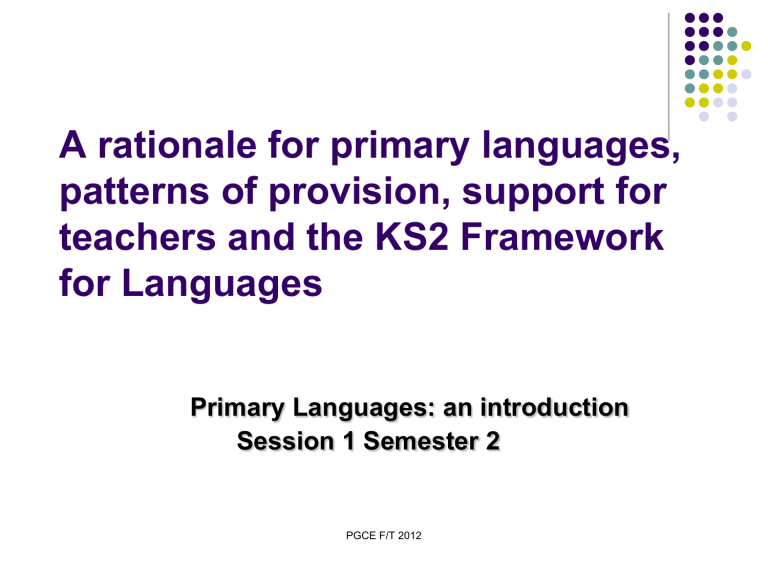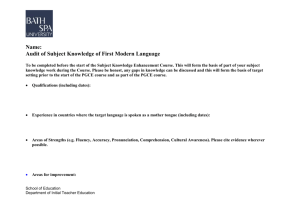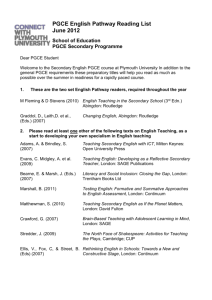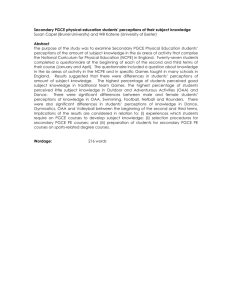A Rationale for Primary Languages

A rationale for primary languages, patterns of provision, support for teachers and the KS2 Framework for Languages
Primary Languages: an introduction
Session 1 Semester 2
PGCE F/T 2012
Learning Intentions
To explore our own views and experiences of foreign language learning
To critically analyse recent research which provides a rationale for primary foreign language teaching and learning and to situate this within the context of the recent Primary Review
To consider how schools are approaching the implementation of primary languages and the decisions and challenges they face in doing so
To consider the aims and rationale of the KS2 Framework for
Languages. To become familiar with the structure and layout of the
Framework and to begin to develop an understanding of the 5 key strands which underpin this document
To consider the resources which are available to support the nonspecialist
PGCE F/T 2012
A rationale
What do you see as the benefits of early language learning (ELL)?
Think, pair, share
PGCE F/T 2012
The National Languages Strategy:
Languages for all, languages for life
“Languages are a lifelong skill – to be used in business and for pleasure, to open up avenues of communication and exploration, and to promote, encourage and instil a broader cultural understanding…In the knowledge society of the 21 st century, language competence and intercultural understanding are not optional extras, they are an essential part of being a citizen.”
DfES 2002: Languages For All: Languages for Life - A Strategy for
England. DfES Publications
(page 5)
PGCE F/T 2012
Martin, C. (2008) Primary Languages: Effective Learning and
Teaching, Exeter, Learning Matters
“Learning a language is a valuable and worthwhile enterprise at any age because it provides the possibility of practical communication; it is also a source of valuable intellectual stimulation and enjoyment; it cultivates broader perspectives and insights into other cultures and enables people to gain insights into their own culture and language through contrast”
(Driscoll, 1999, p2)
“The primary curriculum provides a wealth of opportunities for the foreign language to be exploited within other primary topics and the memorisation of stock phrases can be connected to the pupils’ experience through story telling, songs and play activities which help to generate an enjoyable and motivating environment for foreign language learning…pupils can develop confidence in the family atmosphere and caring culture of the primary school with fellow classmates they know well and with whom they have learnt all manner of basic skills over the years.”
(Driscoll, 1999, p12)
PGCE F/T 2012
Making the case –
governors, parents and headteachers talk about the learning and teaching of languages in primary schools
PGCE F/T 2012
Six main aims of primary language teaching
To exploit the linguistic and cognitive flexibility of young children
To exploit the attitudinal and motivational flexibility of primary age children
To raise levels of achievement through learning languages for longer
To exploit the opportunities presented by the particular circumstances of the context of primary schooling for promoting language awareness
To provide young children with an enriching and important experience which will better equip them to understand the realities of life related to European and global citizenship
To equip the next generation with the knowledge, skills and understanding which will enable them to function effectively in international contexts
(Sharpe: 2001: 32)
PGCE F/T 2012
Where were we?
“Because language is a tool for communication – comprising speaking, listening, reading and writing – learning a new language strengthens a child’s command of their mother tongue. Given appropriate opportunities, they will make explicit links between the two”
“…the knowledge, skills and understanding we want children to acquire in languages should be situated within the understanding
English, communications and languages programme of learning in order to best exploit the links between English and the chosen language(s).”
( Independent Review of the Primary Curriculum : Final Report April 2009 - Chapter 5 – Introducing
Languages at Key Stage 2 pp100-108)
Recommendation that languages become a statutory requirement of the National Curriculum at Key Stage 2 from 2011.
PGCE F/T 2012
Where are we now?
“…… we recommend that: modern foreign languages should be a foundation subject at Key Stages 2 – 4”
4.12
“ the optimum age at which to introduce modern foreign language teaching remains a contested matter …. However, we do believe because of its
4.13
importance that it should be included in the National
Curriculum at upper Key Stage 2………
Department for Education, (2011). The Framework for the National Curriculum. A report by the Expert Panel for the
National Curriculum review . (London: Department for Education).
PGCE F/T 2012
Implementing Primary Languages
What have been your own observations of language teaching and learning in school?
How was this organised?
Who taught the lessons?
How much time was dedicated to it?
What were the teachers’ / pupils’ / parents’ responses and views regarding this aspect of the curriculum?
What were your views?
PGCE F/T 2012
Primary Languages in action – what does it look like?
A school’s approach will depend on a variety of factors including:
• Available teacher expertise and staff training needs
• Timetabling and the way in which their curriculum is currently organised
• Size and context of school
PGCE F/T 2012
Which Language(s)……?
Schools are free to choose the language they teach.
This choice is influenced by:
Staff expertise
Support and training available
Decisions made in clusters / networks
Languages offered by local secondary schools
Local community needs
PGCE F/T 2012
Some Statistics
In 2008 The DCSF commissioned research into language learning at KS2 and found that:
French was the most commonly taught (88% of schools)
Spanish next (25% of schools)
German (10% of schools)
A small number of schools (about 3%) offered
Italian, Japanese and Urdu
PGCE F/T 2012
Timing
The Framework makes clear the expectation that schools will plan for no less than 60 minutes per week of dedicated language time.
This might be divided into relatively short sessions e.g.
15 minutes per day
3 x 20 minutes
2 x 30 minutes plus one shorter session of 10 minutes
Additional time can also be found by integrating languages across the curriculum.
PGCE F/T 2012
Staffing Models
Schools are implementing a wide variety of staffing models when it comes to teaching languages. These include:
An existing primary class teacher with a specialist background in languages
An existing non-specialist primary class teacher who undertakes professional development in order to deliver language teaching
A language specialist who might only work at one school or may be shared between schools
Support from a teacher from a linked Specialist Language College or other secondary school
Support from a Local Authority advisory teacher or Advanced Skills
Teacher
A Foreign Language Assistant working with the class teacher
PGCE F/T 2012
Another adult with strong language skills e.g. parent, teaching assistant
The Generalist
The generalist is able “ to draw upon a thorough working knowledge of the pupils’ cognitive development, they also know about the pupils’ personalities and their patterns of behaviour. As a language learner they are more able to understand the difficulties the children may encounter…”
(Driscoll et al: 1999: 46)
They also:
Are able to adapt to changes and can be flexible in their approach to timetabling. This enables teachers to integrate the language into the pupils whole school experience which can then be used as a real means of communication throughout the day.
Are able to draw on a wealth of effective primary pedagogic experience which they can adapt to the teaching of the foreign language
Have positive relationships with the children in their class, one which fosters trust, risk-taking and positive behaviour management
PGCE F/T 2012
“A teacher does not need to be an expert linguist to create an appropriate context that facilitates language learning.”
(Macrory: 2008: 96)
PGCE F/T 2012
Framework – 5 strands
Oracy
(O)
Literacy
(L)
Intercultural understanding
(IU)
Knowledge about language
(KAL)
Language learning strategies
(LLS)
PGCE F/T 2012
Introducing the Framework
PGCE F/T 2012
Support for teachers in implementing
Primary Languages
PGCE F/T 2012
Language Support
www.ttfrench.com/
CD course to brush up.
www.coffeebreakspanish.com
Free podcast courses in many languages www.languagecafe.eu/en/intro.html
Language Cafés www.bbc.co.uk/languages/
Online
PGCE F/T 2012
Planning Support
QCA units: French, German &
Spanish in pdf format http://webarchive.nationalarchives
.gov.uk/20100612050234/http:/
/www.standards.dfes.gov.uk/sc hemes3/subjects/primary_mff/
?view=get
PGCE F/T 2012
Published Resources Support
PGCE F/T 2012
Free resources support
PGCE F/T 2012 24
Languages online
http://www.education.vic.gov.au/languagesonline/french/french.ht
m
Australian site
Free online activities eg. ton animal mange quoi?
Free printable worksheets
Songs
Topic based
PGCE F/T 2012
www.sunderlandschools.org/ ngfl.northumberland.gov.uk/languages/default.htm
wsgfl.westsussex.gov.uk/
PGCE F/T 2012
Support for Intercultural Understanding
http://french.about.com/
Sister sites for Italian, Spanish & German
Lots of linguistic support and Intercultural
Understanding
Site for teacher use rather than students.
http://www.euroclubschools.co.uk/
• French, Spanish and Italian
• Interesting facts, festivals, cooking etc
PGCE F/T 2012
General Support
http://primarymfl.ning.com/
Forum to network & ask questions
Free teacher-made resources & plans
Free mini-blog.
PGCE F/T 2012
Regional Support
http://www.languagessoutheast.ac.uk/
PGCE F/T 2012
Independent Study Task
Read Chapter 8 of Sharpe, K. (2001) Modern
Foreign Languages in the primary school the what, why and how of early MFL teaching
Oxon, Taylor and Francis
Be ready to feed back key learning points next session
PGCE F/T 2012




